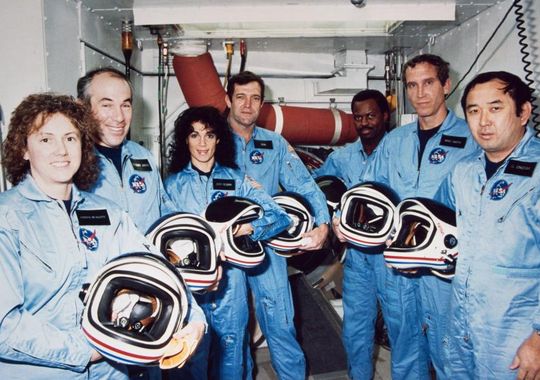(FCN) CAPE CANAVERAL- 29 years ago Wednesday, the space shuttle Challenger vanished from the blue Florida sky, leaving only white corkscrews of smoke hanging in the air.
The explosion occurred 73 seconds into the flight as a result of a leak in one of two Solid Rocket Boosters that ignited the main liquid fuel tank.
Challenger's disintegration after liftoff took the lives of high-school teacher Christa McAuliffe and six fellow astronauts, who perished in front of their families, friends and schoolchildren watching at Cape Canaveral and on live television across the nation.
Afterward, President Reagan told a shocked and grieving nation that the legacy of the accident would not be curtailed ambition for the space program, but accomplishments that would have made Challenger's crew proud.
"To reach out for new goals and ever-greater achievements — that is the way we shall commemorate our seven Challenger heroes," he said.
![635580436523213317-challenger[ID=22466365] ID=22466365](http://www.gannett-cdn.com/-mm-/ea34b1530165d117e3dab11a6ba1795b815a666a/c=17-0-522-380&r=115x86/local/-/media/2015/01/28/WTSP/WTSP/635580436523213317-challenger.jpg)
The Challenger loss shrank America's fleet of shuttles from four to three, and forced important shuttle missions to be put on hold or canceled.
Challenger's legacy is more complex than what Reagan hoped for. The accident taught NASA much about the vulnerabilities of the shuttle and how to make space travel safer, space specialists say.
However, some lessons from the accident eventually were forgotten, with a major consequence being the loss in 2003 of shuttle Columbia, which disintegrated on re-entry over Texas, killing seven astronauts.
The Challenger accident "was significant, because it set in train a whole set of changes at NASA," says Roger Launius, senior curator in space history at the Smithsonian's National Air and Space Museum. But eventually, "a kind of entropy sets in."
The shuttle program was eventually retired in 2011. NASA is working today on the next generation of American manned space flight.
The investigators traced the specific cause of the accident to the shuttle's O-rings, rubbery seals in the two slender rocket boosters that flank the spacecraft. The defective O-rings allowed hot gases and flames to seep out, creating a blowtorch toward the spacecraft.
Four years ago, hundreds gathered at Cape Canaveral to mark the 25th anniversary of the disaster. June Scobee Rodgers, the widow of Challenger's commander, Dick Scobee, urged the crowd to "boldly look to the future" not only in space travel, but in space and science education. She was instrumental in establishing the Challenger Center for Space Science Education.
"The entire world knew how the Challenger crew died," she said. "We wanted the world to know how they lived and for what they were risking their lives."
More stories:


![635580436522277317-challenger-2 [ID=22466367]](http://www.gannett-cdn.com/-mm-/3d5569507733ca056af5edaf0a2a8036c559fb13/r=500x375/local/-/media/2015/01/28/WTSP/WTSP/635580436522277317-challenger-2.jpg)
